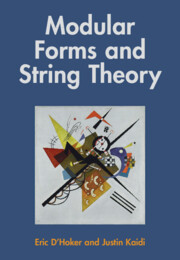Book contents
- Frontmatter
- Dedication
- Contents
- Organization
- Acknowledgements
- 1 Introduction
- Part I Modular forms and their variants
- 2 Elliptic functions
- 3 Modular forms for SL(2; Z)
- 4 Variants of modular forms
- 5 Quantum fields on a torus
- 6 Congruence subgroups and modular curves
- 7 Modular forms for congruence subgroups
- 8 Modular derivatives and vector-valued modular forms
- 9 Modular graph functions and forms
- Part II Extensions and applications
- Part III Appendix
- References
- Index
3 - Modular forms for SL(2; Z)
from Part I - Modular forms and their variants
Published online by Cambridge University Press: 28 November 2024
- Frontmatter
- Dedication
- Contents
- Organization
- Acknowledgements
- 1 Introduction
- Part I Modular forms and their variants
- 2 Elliptic functions
- 3 Modular forms for SL(2; Z)
- 4 Variants of modular forms
- 5 Quantum fields on a torus
- 6 Congruence subgroups and modular curves
- 7 Modular forms for congruence subgroups
- 8 Modular derivatives and vector-valued modular forms
- 9 Modular graph functions and forms
- Part II Extensions and applications
- Part III Appendix
- References
- Index
Summary
In Chapter 2, the dependence of elliptic functions on the points in the torus was studied for a fixed lattice. In this chapter, it is the dependence on the lattice that will be investigated. The modular group SL(2,Z) is introduced as the group of automorphisms of the lattice, and its generators, elliptic points, and cusps are identified. The hyperbolic geometry of the Poincaré upper half plane is reviewed, and the fundamental domain for SL(2,Z) is constructed. Modular forms and cusp forms are defined and shown to form a polynomial ring. They are related to holomorphic Eisenstein series, the discriminant function, the Dedekind eta-function, and the j-function and are expressed in terms of Jacobi theta-functions. The Fourier and Poincaré series representations of Eisenstein series are analyzed as well.
Information
- Type
- Chapter
- Information
- Modular Forms and String Theory , pp. 43 - 70Publisher: Cambridge University PressPrint publication year: 2024
